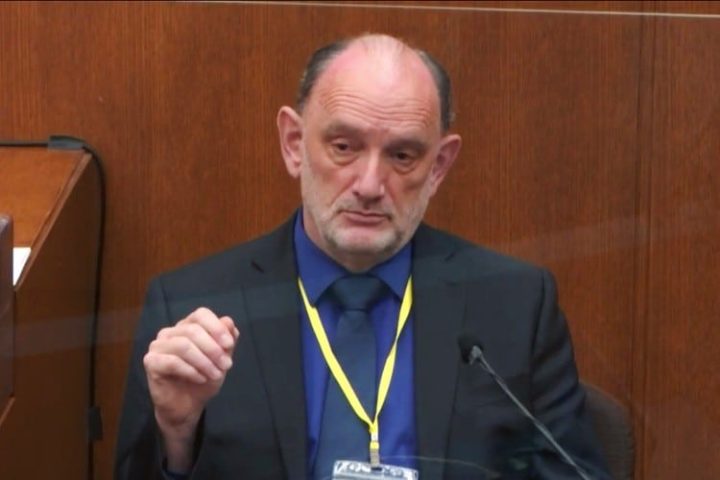
A defense expert testified Wednesday, April 14, that George Floyd’s cause of death cannot be determined because he believes there are many conflicting, contributing factors.
Dr. David Fowler, a forensic pathologist and former Maryland chief medical examiner, who reviewed Floyd’s case for the defense, testified that he’s convinced Floyd died of sudden cardiac arrhythmia owing to his underlying heart-disease condition, not from police restraint.
According to Dr. Fowler, contributing significant factors included Floyd’s ingestion of fentanyl and methamphetamine as well as the paraganglioma tumor in his pelvis, a tumor in which in some cases secretes adrenaline.
Another contributing factor the physician cited was one not previously mentioned in court — carbon monoxide poisoning from the exhaust of the police squad car. Dr. Fowler testified that Floyd had to have suffered from carbon-monoxide poisoning because his head was so close to the squad car’s exhaust. Floyd was never tested for carbon monoxide, but Fowler said that because of his heart conditions, Floyd was vulnerable to even a small amount.
Dr. Fowler also testified about the drugs found in Floyd’s system at the time of death.
A key autopsy report introduced as evidence in pre-trial motions reveals that drugs were indeed found in Floyd’s bloodstream. Previously, defense attorney Eric Nelson told the jury the autopsy found a mixture of methamphetamine and fentanyl, known as a speedball. Nelson played a clip of Floyd allegedly saying “I ate too many drugs,” while being detained.
Fentanyl, a powerful anesthetic, is about 80 to 100 times more potent than morphine. According to the Drug Enforcement Agency website, fentanyl overdose may result, among other things, in respiratory failure leading to death.
The autopsy findings revealed a concentration of 11 nanograms per milliliter in Floyd’s blood that was taken immediately at the scene. Reportedly, handwritten notes taken when the medical examiner briefed prosecutors on his analysis suggest the dose was “very high” — but not necessarily fatal. “If he were found dead at home alone and no other apparent causes, this could be acceptable to call an O.D. [overdose],” noted the medical examiner. “Deaths have been certified with levels of 3 … But I am not saying this killed him.”
Experts point to the possibility that people who have struggled with opioid addiction build up a tolerance for the drugs, so even the higher doses may have less of an effect.
Dr. Fowler repeatedly dismissed the significance of Officer Derek Chauvin’s knee on Floyd’s neck. Nelson asked whether Chauvin’s knee in any way “impacted the structures of Mr. Floyd’s neck?”
Dr. Fowler replied: “No, it did not. None of the vital structures were in the area where the knee appeared to be from the videos.” It was determined that all of Floyd’s injuries were in areas where the knee was not — the front of the body, his face, places where he was restrained, but not in the back or neck. There were no bruises or abrasions on Floyd’s neck or back. Dr. Fowler suggests the amount of force applied to Floyd was less than the amount that causes bruising.
The knee also didn’t obstruct either carotid artery [which supply the head and neck with oxygenated blood], Dr. Fowler said. And “even if it had obstructed one, the carotid artery on the other side plus the two vertebral arteries [major vessels of the neck that provide arterial blood supply to the upper spinal cord, brainstem, cerebellum, and a part of the posterior cerebral hemisphere] in the neck would have supplied the brain with enough blood for it to function.”
Dr. Fowler also observed that Floyd talking and making sounds suggested his ability to breathe. “Any of the sounds Mr. Floyd is making requires you to take air in and out ,” Dr. Fowler said of bystander and police body-camera videos showing Floyd pleading to breathe as three officers restrained him for what turned out to be more than nine minutes. “You cannot make sound unless you’re moving air and your mouth is open.”
During previous hearings, the prosecution presented a starkly different picture. “You will learn he [Floyd] did not die from a drug overdose,” said state attorney Jerry Blackwell, previewing the prosecution’s case.
The Hennepin County Medical Examiner’s Office ruled last year that the manner of death was homicide. The chief medical examiner who ruled Floyd’s death a homicide testified last week that the way police held him down and compressed his neck “was just more than Mr. Floyd could take,” given the condition of his heart. Other medical experts called by the prosecution have gone further, testifying that Floyd died of asphyxia or receiving insufficient oxygen.
Today, both sides rested their case, with closing arguments set for Monday.




